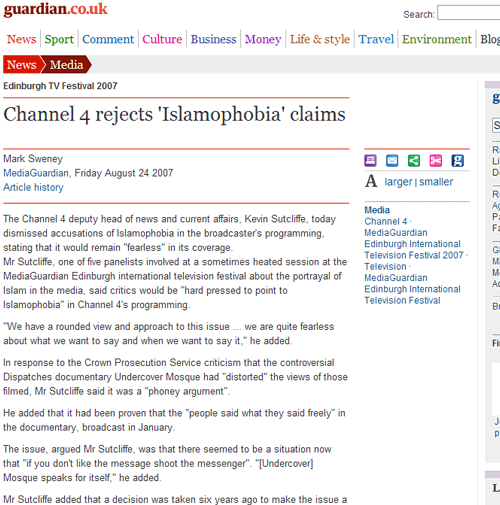Channel 4 rejects ‘Islamophobia’ claims
Mark Sweney, MediaGuardian
Friday August 24 2007
This article was first published on guardian.co.uk on Friday August 24 2007.
It was last updated at 11:20 on January 08 2008.
The Channel 4 deputy head of news and current affairs, Kevin Sutcliffe, today dismissed accusations of Islamophobia in the broadcaster’s programming, stating that it would remain “fearless” in its coverage.
Mr Sutcliffe, one of five panelists involved at a sometimes heated session at the MediaGuardian Edinburgh international television festival about the portrayal of Islam in the media, said critics would be “hard pressed to point to Islamophobia” in Channel 4’s programming.
“We have a rounded view and approach to this issue … we are quite fearless about what we want to say and when we want to say it,” he added.
In response to the Crown Prosecution Service criticism that the controversial Dispatches documentary Undercover Mosque had “distorted” the views of those filmed, Mr Sutcliffe said it was a “phoney argument”.
He added that it had been proven that the “people said what they said freely” in the documentary, broadcast in January.
The issue, argued Mr Sutcliffe, was that there seemed to be a situation now that “if you don’t like the message shoot the messenger”. “[Undercover] Mosque speaks for itself,” he added.
Mr Sutcliffe added that a decision was taken six years ago to make the issue a “key plank” in Channel 4’s strategy and that it was “about engagement and trying to understand” Islam.
Channel 4, had made about 30 films “covering a wide-range issues” across drama, news and current affairs that made for “representative” coverage, he said.
The broadcaster had, for example, been very critical of British foreign policy towards wars in Islamic countries, he added.
Inayat Bunglawala, assistant secretary-general of the Muslim Council of Britain, agreed that following events such as 9/11 and the bombings in Madrid and London it was “inevitable” there would be an “increased scrutiny of Muslim organisations and mosques”.
However, he said that he was “entitled to ask if it is fair”. He then stated that Muslims and Islam “does not have a level playing field in the media in this country”.
Mr Bunglawala expressed concern over “authored documentaries” in which “journalists have an axe to grind”. He cited a Panorama documentary by John Ware as an example.
Maryam Namazie, spokesperson of the Council of ex-Muslims of Britain, strongly disagreed, arguing that the UK media was too soft in its coverage of Islam. “Media doesn’t cover the realities of Islam at all, it is very soft,” she said.
She added that the political Islamist movement in Britain and Europe had engineered a “victim status”, whereby criticism of Islam was being equated to racism against Muslims.
“Criticising a belief is not racism, it is not the case that that Muslims are being vilified,” Ms Namazie said.
To contact the MediaGuardian newsdesk email editor@mediaguardian.co.uk or phone 020 7239 9857. For all other inquiries please call the main Guardian switchboard on 020 7278 2332.
If you are writing a comment for publication, please mark clearly “for publication”.


